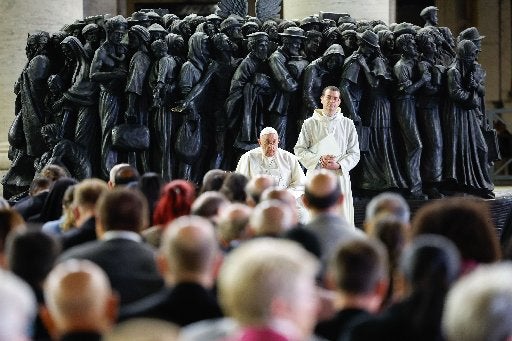Memory book: Pope reviews his life and shares dreams for future
VATICAN CITY (CNS) — Asked to reminisce about his life and where he was at key moments in history, the 87-year-old Pope Francis obliged, but also used the opportunity to talk about the lessons the events hold today and his hope for the future.
The book, “Life: My Story Through History,” written with Italian journalist Fabio Marchese Ragona, begins with Pope Francis explaining that while he was only 3 years old when World War II started, he remembers his parents talking about a “monster” — Hitler — and his family and neighbors sharing letters from relatives still in Europe.
“Even though it happened more than 80 years ago, we must never forget the moments that devastated the lives of so many innocent families,” the pope said in the book.
“War eats you up inside,” he said, before adding, “You see it in the eyes of young children who no longer have any joy in their hearts, only terror and tears.” Since Russia’s large-scale invasion of Ukraine in 2022, he has spoken often of meeting Ukrainian children who still look frightened even though they are safe in Italy.
The book, published by HarperCollins, generated headlines March 14 when excerpts were published with the pope saying he had no plans to resign, he knows some people strongly disapprove of the way he has carried out his ministry and he defended the Dicastery for the Doctrine of the Faith’s note that priests can give informal blessings to gay couples.
Perhaps less newsy, but still strikingly strong were his comments about antisemitism, about abortion and about migration.
He talks about growing up as a child of immigrants in a neighborhood full of immigrants and wonders if they initially were considered a threat when, “in fact, they were just trying to make a future for their children.”
Hostility to immigrants, he said, is the fruit of “prejudice that corrupts the soul; it is wickedness that kills.”
While he remembers the tension and worries of adults around him during World War II, it was only as he grew up that he learned about the Shoah and Hitler’s murderous rampage against Jews, Roma, homosexuals and people with disabilities.
“We cannot turn a blind eye to cases of anti-Semitism, racism or discrimination,” the pope said. “We must defend the sanctity of human life. The name of God is profaned and defiled in the madness of hate.”
Describing watching with other young Jesuits as Apollo 11 Commander Neil Armstrong became the first person to walk on the moon in 1969, Pope Francis moves quickly to a discourse on the marvels of scientific and technological advancement, but also the need to ensure that progress is used ethically.
That ethical care is lacking in the development of increasingly sophisticated weapons of war, he said, and especially in the manipulation of unborn human life, such as with in vitro fertilization and surrogacy.
“We must always protect human life, from conception to death,” he said. “I shall never tire of saying that abortion is murder, a criminal act; there is no other word for it. It involves discarding, eliminating a human life that is without fault. It is a defeat for everyone who carries it out and anyone who is complicit in it: mercenaries, killers for hire!”
Pope Francis also talks about the state of the church and the world today.
“I still cultivate a dream for the future: that our Church might be a meek, humble, servant church, with all the attributes of God — therefore also tender, close and compassionate,” he said. “We must simplify things as we look to the future, overcome clericalism, that is, the view of clerics as an elite with an attitude of moral superiority over and distance from the faithful. It has become a disease, a plague!”
The pope said the church must act as a mother, “who embraces and welcomes everyone, even those who feel they are in the wrong and have been judged by us in the past. I think, for example, of homosexuals and transsexuals who seek the Lord but are rejected or persecuted.”
The Gospel mission of proclaiming God’s love to all, he said, is the foundation of the approval he gave in December to the Dicastery for the Doctrine of the Faith’s publication of “Fiducia Supplicans” (“Supplicating Trust”), which allows Catholic priests to bless a same-sex or other unmarried couple. However, it cannot be a formal liturgical blessing, nor give the impression that the church is blessing the union as if it were a marriage.
“They are all children of God and must be welcomed with open arms,” Pope Francis said.
However, he said, the blessings do not mean the church is in favor of same-sex marriage, because “we do not have the power to change the sacraments created by the Lord.”
The pope did, though, reaffirm what he has said in the past about civil unions: “these people who experience the gift of love should have the same legal protections as everyone else.”
The key to the future, Pope Francis said, is for everyone to pray more and to love more.
“How many things would have gone differently in the past eighty years of history if love and prayer had motivated human beings rather than the thirst for power,” he said.
